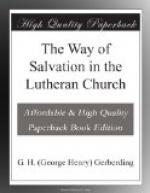The same divine Saviour now works through means. He has founded a Church, ordained a ministry, and instituted the preaching of the Word and the administration of His own sacraments. Christ now works in and through His Church. Through her ministry, preaching the Word, and administering the sacraments, the Holy Spirit is given. (Augsburg Confession, Article 5.) When Christ sent forth His apostles to make disciples of all nations, He instructed them how they were to do it. The commission correctly translated, as we have it in the Revised New Testament reads thus: “Go ye, therefore, and make disciples of all the nations, baptising them into the name of the Father, and of the Son, and of the Holy Ghost; teaching them to observe all things whatsoever I commanded you; and lo, I am with you alway, even unto the end of the world.” Here then is the Saviour’s explicit instruction. The Apostles are to make disciples. This is the object of their mission. How are they to do it? By baptizing them into the name of the triune God, and teaching them to observe all Christ’s commands. This is Christ’s own appointed way of applying His Grace to sinful men, and bringing them out of a state of sin into a state of grace.
And this is the Way of Salvation in the Lutheran Church. We begin with the child, who needs Grace. We begin by baptizing that child into Christ. We, therefore, lay much stress on baptism. We teach our people that it is sinful, if not perilous, to neglect the baptism of their children. The Lutheran Church attaches more importance to this divine ordinance than any other Protestant denomination. While all around us there has been a weakening and yielding on this point; while the spirit of our age and country scorns the idea of a child receiving divine Grace through baptism; while it has become offensive to the popular ear to speak of baptismal Grace, our Church, wherever she has been and is true to herself, stands to-day where Martin Luther and his co-workers stood, where the confessors of Augsburg stood, and where the framers of the Book of Concord stood.
The world still asks: “What good can a little water do?” We answer, first of all: “Baptism is not simply water, but it is the water comprehended in God’s command, and connected with God’s Word.” (Luther’s Small Catechism.) The Lutheran Church knows of no baptism that is only “a little water.” We cannot speak of such a baptism. Let it be clearly understood that when we speak of baptism, we speak of it as defined above, by Luther. We cannot separate the water from the Word. We would not dare to baptize with water without the Word. In the words of Luther, that would be “simply water, and no baptism.” Let it be kept constantly in mind that whatever benefits and effects we ascribe to baptism, in the further forcible words of Luther’s Catechism: “It is not the water, indeed, that produces these effects, but the Word of God which accompanies and is connected with the water, and our faith which relies on the Word of God connected with the water.” If now the question is further asked: What good can baptism as thus defined do? we will try to answer, or, rather, we will let God’s Word answer. “What saith the Scripture?”




